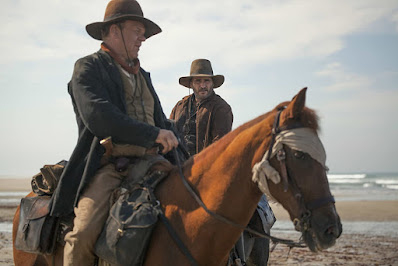THE SISTERS BROTHERS (2018)
By Ralph Santini - ***½
There have been some speculation
about the reception and radar status of French director Jacques Audiard’s western
with dark comic touches “The Sisters Brothers”. All I know is that it’s his
first film in English and it’s a coproduction between French and American
filmmakers and that the director co-wrote the script with Thomas Bidegain as an
adaptation of a same name book by Patrick De Witt who’s from Canada. The title
role is given by two millennium Hollywood greats John C. Reilly (co-producer of
the movie as well) as Eli and Joaquin Phoenix (excellent) as Charlie. Their
objective is to hunt down a young scientist (Pakistani-British actor Riz Ahmed)
on the hunt for gold with the “help” of a private investigator played by the
equally excellent Jake Gyllenhaal. Coming back to the film’s speculation the
film apparently bombed at the box office and there have been some criticism
with the film’s dark comic traits confusing some reviewers, including Owen
Gleiberman, formerly who said and quote “he Sisters Brothers is too light to be
a true drama and too heavy to be a comedy”. Personally I didn’t mind any of
that because I think this film is brilliant from start to finish.
A corrupt commodore (The sadly late Rutger
Hauer) offers two gunslingers known as the Sisters Brothers to hunt down a
young chemist named Herman Kermit Warm who wants to find some valuable gold in
the west. That same young chemist is not only pursued by the Sisters Brothers
themselves but also Private Investigator, John Morris. We are first told that
Morris wants to actually befriend the chemist by disguising himself as a journalist.
It turns out that Morris P.I. job happens to be co-involved with that of the
Sisters Brothers engineered by the commodore. Warm’s goal is to go on a trial
headed for Jacksonville. No, it’s not the well-known city in Florida, it’s
actually a roughly-similarly named town in Oregon which, yes, in fact exists. So
like I said The Sisters Brothers and John Morris are both involved in this job
against Mr. Warm. Morris is supposed to hand over this scientist to the Sisters
Brothers, however Warm gets wise by staring at Morris’ handcuffs. So the
scientist gives the private gumshoe a surprise at gunpoint attempting to escape
but unfortunately he is put under restraint. We then get the answer concerning
the scientist’s goal and that is to find gold so he can develop a chemical
formula. The only problem is that the Sisters brothers must retrieve that
formula for the absolute, no-good commodore. Morris then spares Warm then both
of them leave Jacksonville. Warm then explains that the chemical formula is to
free American society from all evils of mankind starting with Dallas, Texas.
Considering the unfortunate bombing
at the box-office, I think this is a true miracle of 21st century
filmmaking. Both Reilly and Phoenix have terrific chemistry as the constantly
bickering brothers who would make one big slappy family. There is an absolutely
hilarious scene where Reilly is upset because he retorts Phoenix that he hit
him, so Phoenix hysterically tells him to hit him back and Reilly punches him
with pleasures. I also love the movie’s dark sense of humor because the old
west was never exactly a pleasant place to live. In fact that’s what makes this
film superior to Seth McFarlane’s simple but tired “A Million Ways To Die In
The West”. It’s a colossal leap forward in the sense that “The Sisters
Brothers” is, as the way I personally see it, a Western parody but with more
intellectual traits and darker comic slapstick. Credit must also be given by
the rest of the cast, particularly Riz Ahmed as the consciously aware scientist
and Jake Gylenhaal as the private investigator.






